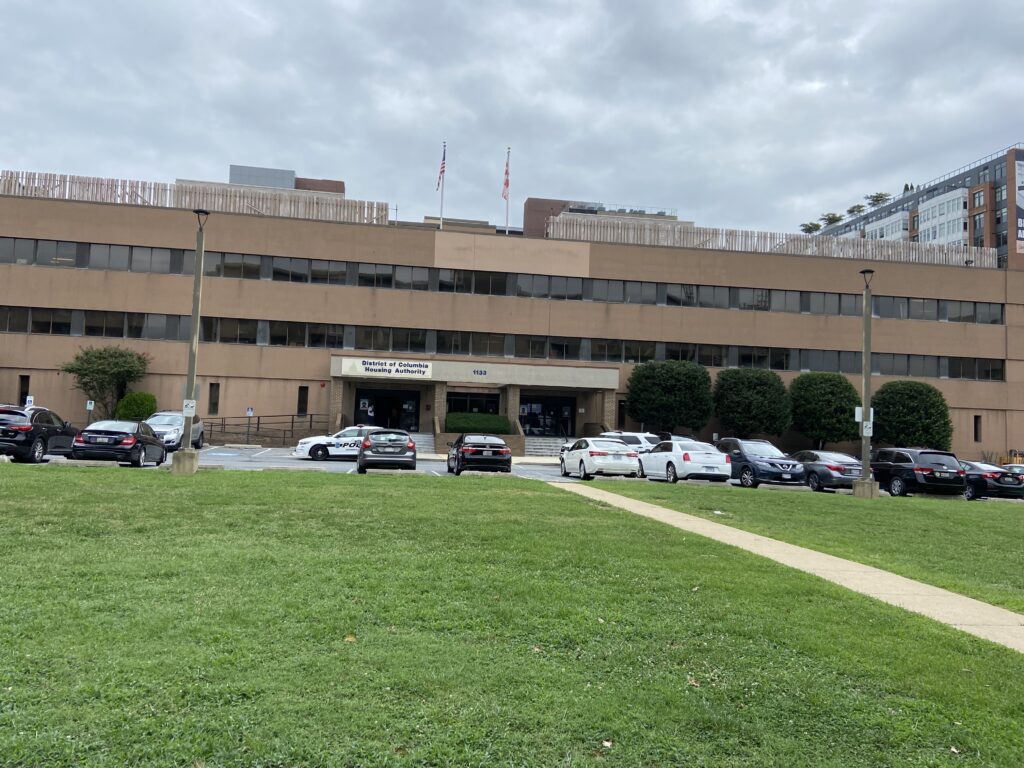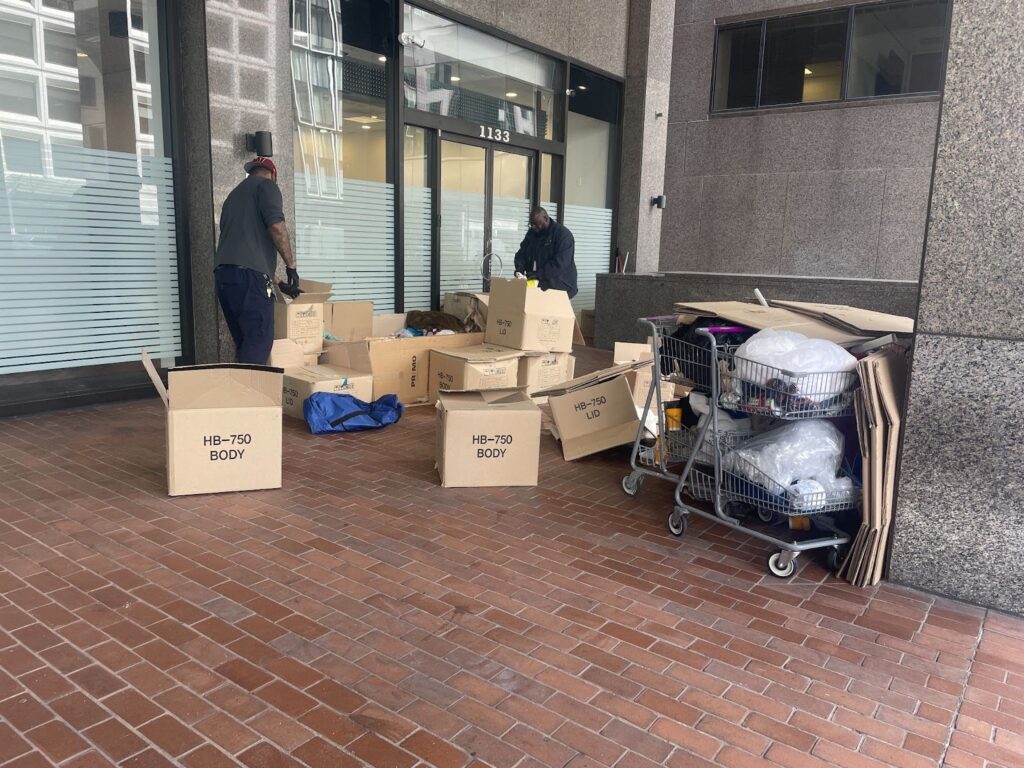When Marcus McCall turned 18, he signed up for D.C.’s housing waitlist with the help of the Child and Family Services Agency. Once he made it to the top of the list, he’d be able to get into public housing or obtain a voucher to use toward rent. What McCall didn’t know at the time was that it would be another 15 years before he would finally receive either.
He wasn’t the only one waiting — in 2008, when he signed up, there were 58,000 people ahead of him.
Three years after he initially signed up, McCall went to the offices of the D.C. Housing Authority (DCHA), which manages the waitlist, to update his information. He had aged out of foster care and was struggling to find a place to stay in a city with ever-rising rents. He would remain unhoused until 2022.
His 15 years waiting for a voucher changed his life. “Most of my mental health issues came from being homeless — I was just stressed out, paranoid for my life, and depressed,” said McCall, who is now a vendor with Street Sense Media.
McCall moved into housing earlier this year through Permanent Supportive Housing, a program serving people who experience long periods of homelessness. Though he feels blessed to have his new apartment, his name still hasn’t come up on the DCHA waitlist, which now has 40,000 people on it.
Every budget season for the past eight years, housing advocates and providers have demanded that the D.C. government allocate more funds toward Local Rent Supplement Program (LRSP) tenant-based vouchers to pull people off the list and into housing. This year, the Fair Budget Coalition asked for $17.33 million to fund an additional 800 such vouchers. The budget approved by the D.C. Council included 20. Though DCHA is currently attempting to update the information of people on the waitlist in order to determine how many still need housing, providers say that, absent more funding, there is little the agency can do to help those who do.
Housing people 18 years later
DCHA’s housing waitlist is the only centralized place where low-income D.C. residents can go to apply for help affording their housing. Unlike other housing programs in D.C., which have limited eligibility or require referrals, all low-income residents are eligible. At least that’s true when the waitlist is open; it’s been closed since 2013 due to the high volume of applicants.
The waitlist is separated into three categories, which advocates generally refer to as three separate lists — the public housing waitlist, the housing choice voucher waitlist and the “moderate rehabilitation” (or Mod Rehab) waiting list. People seeking housing can choose to be on one, two or all three of the sublists.
DCHA housed 1,557 people on the waitlist in fiscal year 2021 and another 613 so far in FY 2022, according to the agency’s oversight responses to the D.C. Council. The agency is still pulling people into housing who originally applied in early 2004.
“Most people don’t even talk about the waitlist because they’ve been on it for so long — it’s like, what’s the point?” said Brit Ruffin, senior counsel at the Washington Legal Clinic for the Homeless. “They’ve given up hope that they will ever get housing through the list because of how long they’ve waited.”
Circumstances during the wait for housing can be dire. While people experiencing homelessness are theoretically prioritized on the waitlist, up to 22,000 people still on the voucher sublist were experiencing homelessness when they signed up. Since DCHA’s information is not up to date, it’s unknown how many are currently unhoused but the number may well be smaller — though flawed, D.C.’s most recent Point-in-Time Count showed a total of 4,400 people experiencing homelessness as of January 2022.
Still, McCall said, he’s met a lot of people on the streets and in shelters who are waiting for a voucher. And the time they wait can affect the rest of their life. In addition to his mental health, McCall is still struggling to find employment because of his criminal history, which he blames on his time experiencing homelessness. McCall sought out odd jobs to pay to stay at a hotel or with friends, but making money often meant selling drugs.
“It just seemed like the more and more my housing situation got worse, I took to the streets,” McCall said.
What might have happened if McCall had received housing within one or two years of his initial application? To him, the scenario is barely recognizable.
“I probably would have had a high school diploma,” he said. “I probably would have been a successful educated Black man. I probably could have done that too then — just so much was coming at me all the time.”
Amanda Korber, supervising attorney at Legal Aid’s housing unit, said the organization receives calls every week from residents on the list. Many are living in unaffordable apartments or are about to be evicted — and hope the waitlist they put their name on years ago could be the salvation.
“They’re just desperately trying to see what happened with their name on this list,” Korber said. “Did they miss a call? Did they miss a letter? Or is it really that just they’re still not up yet?”
It’s too late for some people when their name comes up, according to Ruffin. Many of her clients who signed up 15 years ago have moved out of D.C., been displaced by rising prices, or have different needs than they did initially.
“They needed the housing when they applied,” Ruffin said. “If they weren’t homeless yet, they probably went into homelessness. If they couldn’t survive in D.C., they probably left D.C.”
Housing people who can’t be found
The waitlist delays create another obstacle — trying to locate people with outdated information.
People who signed up in 2004 are likely to have moved, and they may not use the same phone number or email address they put down in their initial application. This could be one reason that, when public housing units or vouchers do become available, the response rate is so low DCHA has had to quadruple the number of people who are contacted, according to the agency’s testimony at a March 3 oversight hearing.
In an effort to avoid this problem, DCHA launched a campaign on April 26 calling for those still on the waiting list to update their information in the next 60 days. The main goal is to streamline the process of connecting people who want and need public housing to the hundreds of vacant units, but the campaign extends to people waiting for vouchers and Mod Rehab housing. Though the agency has been connecting with community organizations, running public service announcements, and posting on its social media, advocates worry about how many people the campaign is likely to reach.
“I don’t know how in touch people are with messaging from the Housing Authority that they would even know they need to update their information,” said Rebecca Lindhurst, managing attorney at Bread for the City.
At a June 8 meeting of DCHA’s Board of Commissioners, Executive Director Brenda Donald said about 3,500 people had updated their information so far.
According to Korber, if someone doesn’t respond when DCHA reaches out to offer housing, that person can reclaim their place on the waitlist by contacting the agency later. Still, Lindhurst is wary about removing people from the list who may still be waiting for housing. According to DCHA’s own numbers, only 15,000 people on the list are definitely housed through other programs, meaning that potentially up to 25,000 people are in unstable housing.
Ruffin offered a broader criticism: Making the list smaller doesn’t change the fact people have already been waiting for over a decade — with no ability for anyone else to apply for housing as well.
“Updating the waitlist is great, but even with updating there can be no movement without money,” she said.
Housing people without money
No matter what DCHA does to improve the administration of the list, the agency is bound by the funding it has. The number of public housing units has remained stagnant despite the need — rehabbing vacant units to bring them back online is costly, and building new complexes takes years. That leaves vouchers as the solution preferred by most advocates.
While DCHA has not sought funding for additional vouchers to pull people off the list and declined to answer a question about whether an increased allocation would help the situation, it’s the mayor and councilmembers who need to act if the city is to serve the people who have been waiting, according to Korber.
“I don’t really think that’s something the Housing Authority can solve without the money to solve it,” she said.
When residents’ names come up for a voucher, they can receive either an LRSP tenant-based voucher, funded by D.C., or a subsidy from the Housing Choice Voucher Program (HCVP), funded by the federal government. DCHA manages about 11,000 federal vouchers and just under 5,000 LRSP tenant-based vouchers. Neither program has a time limit as long as households prove they continue to be eligible. Meanwhile, 37,000 people are on the waitlist.
The federal government has not increased D.C.’s HCVP funding in recent years — in fact, local officials created LRSP in 2007 because a cut in federal spending would have meant some residents lost their vouchers if the city hadn’t filled the hole. While Democrats have floated national proposals that would result in more HCVP funding for D.C., there’s been no movement so far on specific plans, such as President Joe Biden’s call for an increase of 200,000 vouchers nationally.
This leaves local funding increases. The last substantial boost in the LRSP tenant-based voucher program was last year’s $7.8 million for 310 families on the waitlist — $10 million short of the amount sought by housing advocates for the FY 2022 budget.
This year, Mayor Muriel Bowser included no new money for LRSP vouchers in her FY 2023 budget proposal, and the D.C. Council’s Committee on Housing and Executive Administration only added 20 new vouchers to pull people off the list. The council did not further increase the spending level in its subsequent budget deliberations. Not only does this mean it’s unlikely much progress will be made on reducing the waitlist this year, advocates say, it also prolongs the day the list can be reopened.
Since the list was last opened in 2013, Ruffin pointed out, the cost of living in D.C. has increased, meaning thousands more residents are likely to need the help of DCHA programs. Even if the list were open, new sign-ups would probably face an even longer wait if existing supply and demand patterns hold.
“If you got on the waitlist today, you probably wouldn’t see a voucher in your lifetime,” Lindhurst said.
While the waitlist is not the only mechanism to address affordable housing needs in D.C., advocates argue that it’s the best way to identify who needs housing and ensure they have it. They’re likely to lobby for new LRSP vouchers again for next year’s budget. And McCall is hoping some of the tens of thousands of people with whom he waited for housing will get the same sense of relief he did.
“It was just a long process and very hard, so I’m glad it’s over with for me,” he said.
Those currently on the waitlist can go to www.dchousing.org to update their household and contact information through June 30. Go to “Customers”; then “Documents and Forms”; and then “Waitlist Customer Contact Information” to get the form, which should be downloaded and emailed to [email protected]. Applicants can also update their information by calling 844-306-0531.
This article was co-published with The DC Line.
Annemarie Cuccia covers DC government and public affairs through a partnership between Street Sense Media and The DC Line. This joint position was made possible by The Nash Foundation and individual contributors.








